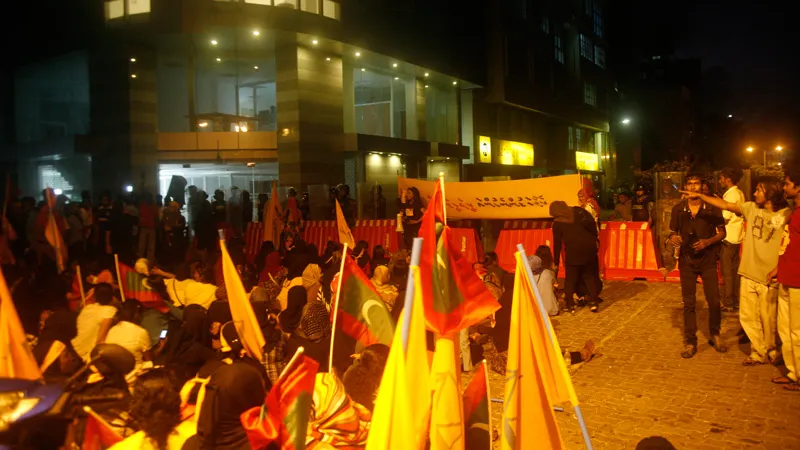
The Yameen leadership cannot be blamed for such ignorance and/or innocence. Over the past weeks and months, the Government has got Parliament to amend relevant laws to make free-wheeling public assembly/protests impossible without advance police approval. It has made defamation a 'criminal offence'. In the former, there can be clear ways to obtain-or-reject requests for public protests. In the case of latter, the dividing line, involving especially the media, is always thin.
The only hurdle for the Maldivian Opposition is that most democratic nations have such laws. The Yameen leadership is not shy of flagging the names, either, though not in international fora, as such. It has also left it to a pro-Yameen PPM parliamentarian to accuse neighbouring Sri Lanka of giving refuge to 'political plotters' from Maldives. In both cases, there might be something to explain — or, explain away, if Maldives goes 'official'.
The defence on these counts from pro-MUO members of the international community (read: West) could only be diplomatic muscle-flexing and number-churning. It could definitely put Yameen on the defensive more than already. Preparations for present moves could also put China on notice. So could it be in the case of Saudi Arabia, or Russia, or other 'friends of Maldives', as the West and the neighbourhood deems fit.
Maldives could then become a mere pawn in a global game of chess. Who then wins the domestic round could then become inconsequential, especially over the medium and long terms. Theoretically at the very least, there is then the possibility of Maldives being at the centre of an international game, which it’s inherently incapable of playing, leave alone sustaining.
< style="color: #163449;">‘Transitional’ alternative
Any transitional alternative should consider the possibilities of retaining much of the existing structure as it is, if any 'plot' attempt of a constitutional kind were to succeed even remotely. Over-ambitious as Maldivian Opposition leaders are (as much among themselves viz the incumbent), they should then demonstrate the required pragmatism and patience that their much tom-tomed democratic process demands.
Even granting their arguments on the Yameen front, there are ways that they could come together and work together in the interim. That requires an entirely different kind of approach and initiative, not democratic flamboyance, which may not sell beyond a point in Maldives. It was also the case when the nation ushered in multi-party democracy in 2008. Rather, it was vote for change, rather than a vote for democracy or specific individual(s), per se.
Adversaries of Yameen would once again be getting their maths wrong if they were to ignore emerging realities. Even as they are talking about an imminent Al Jazeera exclusive against the Yameen leadership, they need to count if it’s capable of bringing in 'new converts' nearer home, to be capable of defeating him in a 'democratic election' nearer home. They need to check — and even more should their international backers count — the chickens only after all the eggs had hatched.
Together, both need to acknowledge that 'inclusive' elections of the kind that they are asking for can be possible only in a transition, and not when 'inclusive' becomes the 'transition'. It can be achieved — and should be achieved — only through the due process involving parliament and judiciary, and not through undue initiatives at the street-level. Maldives got tired of it, with the pro-MDP riots of February 8, 2012.
At the time, the security forces, starting with the Fire Service personnel, could only wait and watch for the product of arson to die in embers of burnt vehicles as the moderates across the nation got time to sit up and think things over. The result was there to see, to a greater or lesser extent, in Elections-2013. It went beyond what the present-day Opposition believes and wants the world to still believe.
In all this, the 'divided' Opposition should not also overlook the well-timed Moody’s report, including Maldives as a nation worth of credit-rating for the first time, and one that could still pay of bond-buyers of the future. It may not mean much to the island-voters of whatever hue. But there is still un-quantified traction possibly over the Yameen leadership insisting on Maldivians alone being made 'cashiers' in local enterprises some months ago, followed now by repatriation of illegal immigrants, thus creating new jobs for locals.
Whether the local business community is going to be happy over having to pay more for fellow-Maldivians for the same work that legal and not-so-legal immigrants were doing for lesser pay remain to be seen. Yet, Yameen can still flaunt such initiatives addressing the youth, numbering close to half the nation’s population — and at the same time blame the Opposition for possible future dips in tourist arrivals and consequent impact on the economy.
In between, he is putting up a show-piece of the Male-Hulhule sea-bridge linking capital Male and the nation’s only international airport, with Chinese funding, which India as the immediate neighbouring is seriously concerned about, but not necessarily the Maldivian voter. China was also involved in Yameen’s SEZ projects, capable of generating jobs, but no one seems to be talking about it anymore.
< style="color: #163449;">Consequences for India
All of it will have consequences for 'big neighbour' India. The nation would then have to decide first, which side of the emerging Maldivian/international situation it would be. It can play safe, play without showing (off) it hand, yet, play India should. How long and how far could India play such role(s) in tandem or in sequence would also depend not on its own will and initiative(s), but at times on the unpredictability of Maldivian stake-holders (whoever it be), and un-dependability (up to a point, and after a point) of its international friends and allies.
The Sri Lankan case is a typical example for India to mull over. After having India where they wanted at the UNHRC for a short and interim period, the international community did not bother India, or bother about India. The present-day Sri Lankan rulers, successors to former President Mahinda Rajapaksa’s mantle and not his commitments/non-commitments have retained much, if not all, of his Government’s China commitments almost intact. It could not have been otherwise, if any Government in Sri Lanka were to think of Sri Lankan priorities first and foremost.
Read: In Sri Lanka, reconciliation still a non-starter | Rajapaksa camp’s increasing India-bashing
The question could then arise if an incumbent Government in the neighbourhood had out-sourced its security polity to China, the US or some other 'extra-regional' power. In the case of India, it could imply a parallel/simultaneous 'out-sourcing' of neighbourhood policy, in the name of ensuring regional stability and strategic security in what essentially is still the 'traditional sphere of Indian influence' and concerns. On that one question, India and smaller neighbours could be on equal footing then. Rather, smaller neighbours could claim equality, more than equity, in 'out-sourcing' their own security as much as sovereignty.
It would be over-simplification of India’s China concerns if it were to see the ghost where it resides and where it may not reside. In the overall context, it might still India and Indian security interests good, if it were to outsource its China concerns to friends from the West in China’s neighbourhood waters and elsewhere, too, where China can grow wings. Indian Ocean can still remain India’s Ocean if, and only if, India begins treating itself as one to begin with — and secure simultaneously the political and security interests of immediate neighbours. Otherwise and other ways could only complicate matters even more.
The views expressed above belong to the author(s). ORF research and analyses now available on Telegram! Click here to access our curated content — blogs, longforms and interviews.




 PREV
PREV


